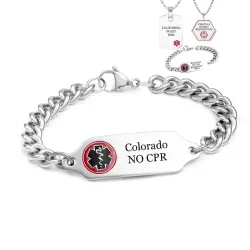 A Do Not Resuscitate (DNR) order is a crucial medical directive issued by a physician. It instructs healthcare providers to refrain from performing cardiopulmonary resuscitation (CPR) if a patient's breathing or heartbeat ceases. This order is established proactively, allowing individuals to make informed decisions about their emergency care.
A Do Not Resuscitate (DNR) order is a crucial medical directive issued by a physician. It instructs healthcare providers to refrain from performing cardiopulmonary resuscitation (CPR) if a patient's breathing or heartbeat ceases. This order is established proactively, allowing individuals to make informed decisions about their emergency care.
It's important to note that a DNR order specifically addresses CPR and does not impact other aspects of medical treatment such as pain management, medication, or nutrition.
Navigating the DNR Decision
For individuals facing end-of-life scenarios or battling incurable illnesses, considering a DNR order is a personal choice. Here are some key points to remember:
- If you wish to receive CPR, no action is required.
- To opt out of CPR, consult your physician about obtaining a DNR order.
- It's advisable to make this decision while you're able to do so independently.
- Educate yourself about your medical condition and its future implications.
- Discuss the advantages and disadvantages of CPR with your healthcare provider.
In hospice care settings, a DNR order often aligns with the focus on comfort and symptom management rather than life prolongation.
Establishing a DNR Order
If you decide a DNR order is right for you, follow these steps:
- Communicate your wishes clearly to your doctor and healthcare team.
- Your physician must honor your decision or transfer your care to a doctor who will.
- In healthcare facilities, any disputes must be resolved within 72 hours to ensure your wishes are respected.
- Your doctor will document the DNR order in your medical records if you're hospitalized.
- For non-hospital settings, ask your doctor about obtaining a DNR wallet card, bracelet, or other documentation.
- Check with your state's Department of Health for standardized DNR forms.
Additional Considerations
- Include your DNR wishes in your living will or health care power of attorney.
- Inform your health care agent and family members of your decision.
- If you change your mind, immediately notify your doctor, healthcare team, family, and caregivers.
- Destroy any existing DNR documents if you reverse your decision.
Remember, these decisions are deeply personal and can be challenging. At Fremont Regional Hospice, we're here to support you and your loved ones through this process, ensuring your wishes are respected and your comfort prioritized.
